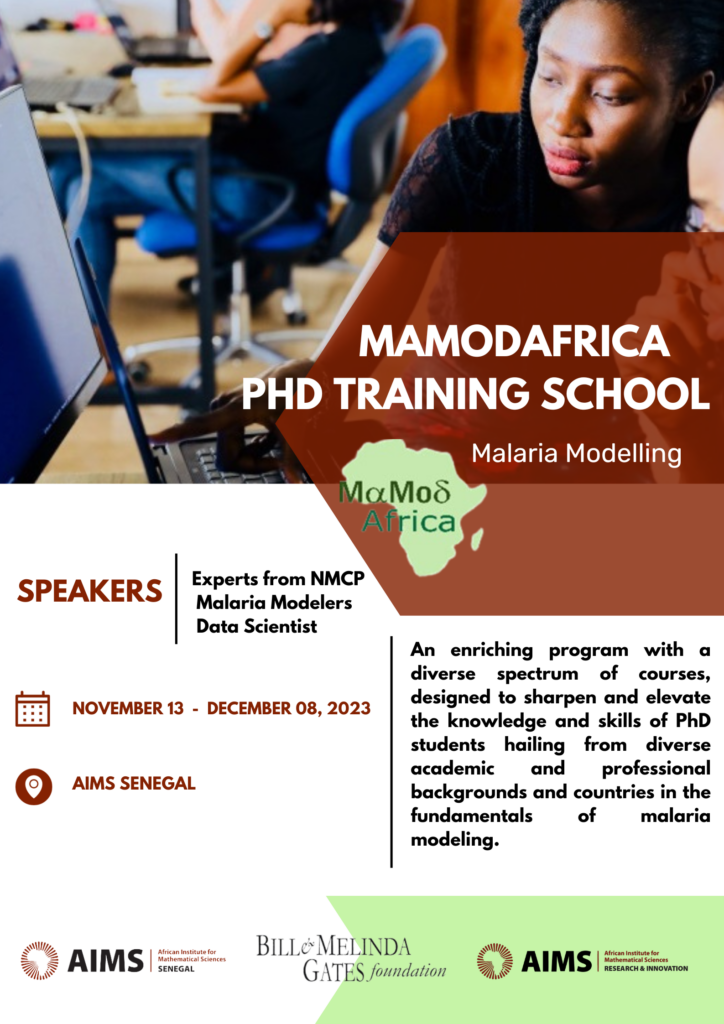Introduction
The collaborative efforts of the African Institute for Mathematical Sciences Rwanda (AIMS-NEI) and the Malaria Modelling for Sustainable Public Health Policies in Africa (MaModAfrica) consortium, are planning for the MAMODAFRICA PhD Training School. The training is designed to sharpen and elevate the knowledge and skills of eight PhD scholarship awardees hailing from diverse academic and professional backgrounds and countries in the fundamentals of malaria modeling. The training will run from November 13 to December 7, 2023, at AIMS Senegal center in Dakar. Students will be immersed in a transformative learning experience, establishing a strong foundation to excel in the realm of malaria modeling.
Rationale
The MAMODAFRICA PhD Training School serves as a critical bridge connecting the dots between disparate academic trajectories and the intricate domain of malaria modeling. Encompassing a multidisciplinary array of courses, this training endeavor is poised to equip fresh MaModAfrica PhD students with a coherent understanding of the foundational principles underlying malaria modeling. Beyond its academic pursuits, this platform is expected to nurture collaborative networks among the students themselves and with a distinguished cadre of experts and supervisors. Through this important interaction, the training school will not only enhance understanding of the layers of PhD program expectations but also craft the path forward in the landscape of malaria modeling using the diverse malaria database and platforms built among the countries NMCP.
Objectives
The MAMODAFRICA PhD Training School is underpinned by a set of major objectives that harmonize varied perspectives into a cohesive pursuit of PhD in Malaria Modeling as follows:
- To ingrain a profound comprehension of malaria modeling principles and prerequisites, essential for a successful PhD journey;
- To cultivate a shared understanding and synchronization of aspirations and expectations between the PhD scholars and their supervisor team;
- To foster an interconnected community of scholars, facilitating enduring networks for mutual learning and enriching exchanges;
- To develop essential methods and mindset for the tutoring process with and among the students and Supervisors
- To give the opportunity for sharing knowledge, experience, training, fellowships, and research opportunities
Expected Results:
The MAMODAFRICA PhD Training School is poised to yield transformative outcomes, namely:
- Participants will develop a firm grasp of the multifaceted dimensions of malaria modeling, priming them for their forthcoming PhD pursuits;
- The training will catalyze a harmonious convergence of expectations between PhD students and their supervisor team, fostering a conducive research environment;
- The training will lay the foundation for enduring bonds among students, forming a vibrant cohort of interconnected scholars;
- The students and supervisor team will consolidate their thesis project and approve the respective tutoring plans
- Students will gain a rich learning experience by exploring the varied depths of specific issues (subject, topics) and coming across valuable knowledge that will be shared among themselves and by their lecturers and supervisors
- Students will get familiar with research, and training opportunities in their field of interest.
Target Group:
The primary beneficiaries of the MAMODAFRICA PhD Training School are eight MaModAfrica PhD scholars,plus Twenty-five slots are available for local participants from Senegal to expand the reach of the training school. These opportunities aim to benefit individuals in Senegal seeking to enhance their skills. Selection will be based on a competitive application process through the AIMS Senegal website. Meals and transportation support will be provided to facilitate their participation.
Training Courses:
The MAMODAFRICA PhD Training School is an enriching program with a diverse spectrum of courses, expertly curated and facilitated by a team of experts from across Africa and beyond. The training will be delivered through a combination of lectures, group discussions, and practical exercises ( some through case studies) . In addition, whenever possible, experts will respond for language needs of the trainees, particularly ensuring that participants can communicate their questions, thoughts, and insights in English, Portuguese and French in order to have interactions that are more meaningful and discussions. The following courses constitute the cornerstone of this training program.
- Epidemiological Concepts (bioepi_concepts): Introduction to fundamental concepts in epidemiology, including measures of disease frequency, study designs, and basic data analysis.
- Infectious Disease, Malaria Epidemiology, and Control (bioepi_infdis): Focuses on the epidemiology of infectious diseases, with a specific emphasis on malaria, its transmission, and strategies for control.
- Malaria Biology, Vectors, and Climate (bioepi_malbio): Explores the biological aspects of malaria, its vectors (usually mosquitoes), and how climate factors influence disease transmission.
- Model Conception (bioepi_mod): From Description of a Phenomenon to Equations: Teaches the process of conceptualizing real-world phenomena into mathematical models for analysis.
- Compartmental Models of Infectious Disease Dynamics (mod_compart): Covers compartmental models like SIR (Susceptible-Infectious-Recovered) for studying disease spread.
- Malaria Models (mod_malmod): From Ross-McDonald to Individual-Based: Examines various models for studying malaria transmission, from classical to individual-based approaches.
- Simulation Algorithms and Numerics (mod_simul): for Epidemiological Models: Focuses on simulation techniques and numerical methods used to analyze epidemiological models.
- Parameter Inference (mod_infer): Teaches methods to estimate model parameters using different approaches, including Frequentist, Maximum Likelihood, Bayesian, and simulation-based methods.
- Geospatial Modeling (mod_geospat): Explores the integration of geographical information with epidemiological models for spatial analysis of disease dynamics.
- R Coding for Data Management, Data Analysis, and Data Quality Assessment (code_R): Provides skills in using the R programming language for data-related tasks in epidemiology.
- Computing/Unix/Clusters/Version Control (code_basic): Covers essential computing skills, Unix-based systems, cluster computing, and version control for collaborative work.
- Scientific Writing and Presentation Skills (comm_writing): Focuses on effective communication of research findings through scientific writing and presentations.
- Team Building for PhD Students (comm_team): Aims to develop interpersonal and collaborative skills for successful teamwork, and knowledge sharing during the PhD journey.
- to develop interpersonal skills in bibliometric, citation rules and may include transversal topics about ethical and research integrity.
- : Addresses the importance of gender and diversity considerations in epidemiological research and creating inclusive environments.
You can see here the Poster and Schedule

